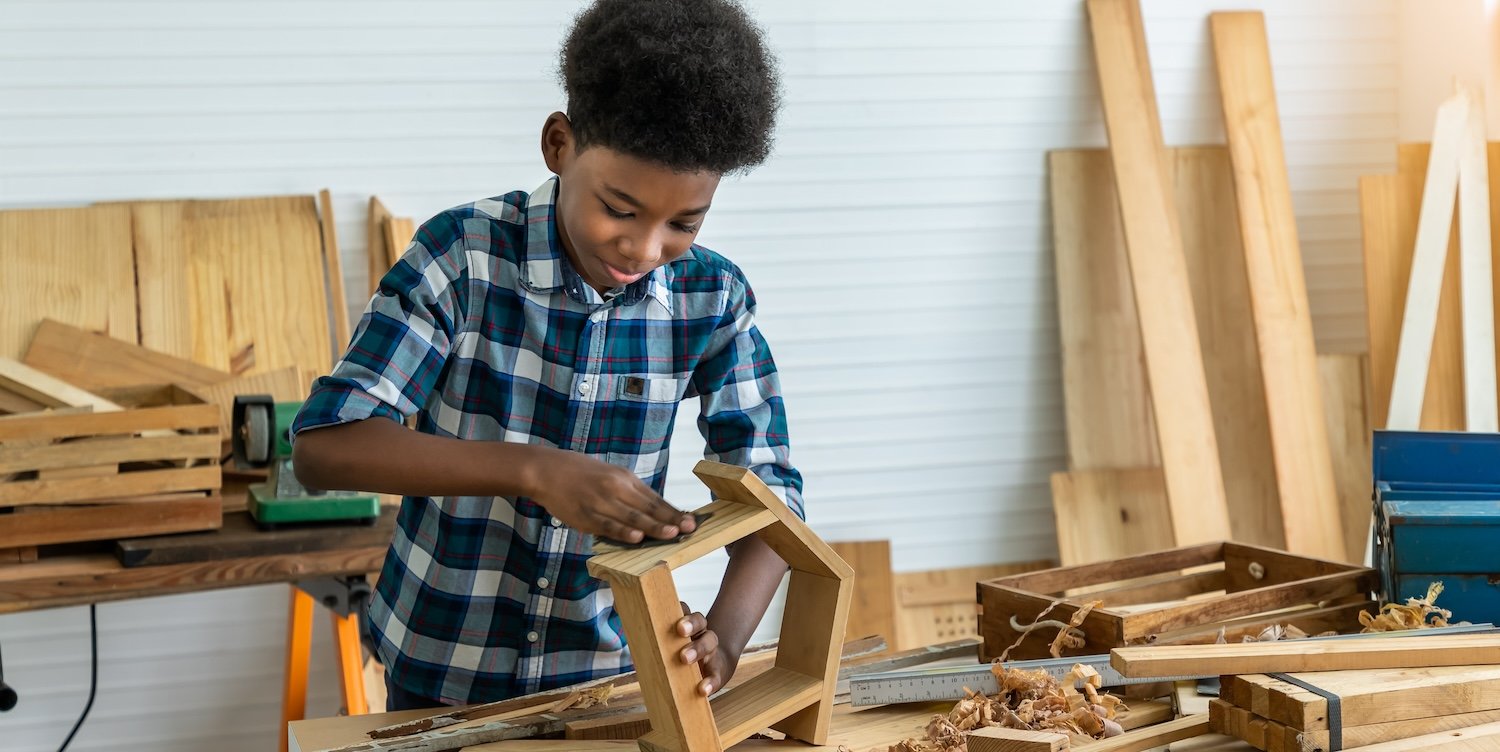Ingredients for Successfully Communicating with Boys

When tasked with the challenge of representing adult voices in the classic Peanuts television specials, then music director Vince Guaraldi and producer Lee Mendelson quickly turned to a peculiar solution: a trombone player. The muted “wah wah” sound of the trombone fit their criteria of representing what an adult might sound like to a child. Their artistic decision was both bold and familiar. Years later, adults and children alike mimic that muted trombone “wah wah” to signal our annoyance or boredom with a communication.
Given that regular and open communication with our sons is essential, how do we become more than a “wah wah” sound and encourage our sons to communicate openly with us? How do we ensure our sons feel heard and that they hear us? Here, we gather insights from a few leading psychologists on boys and adolescence to help us answer these questions. We’ll discover that we must be present, and we must have their trust. And, we’ll need to be patient, especially in those moments in which it’s the hardest thing to do.
Establishing Trust & Minimizing Vulnerability
Adam Cox, author of Cracking the Boy Code: How to Understand and Talk with Boys, emphasizes the importance of tone when he says: “Your voice is the single most powerful tool you have in establishing safe, positive connections with boys.”1 So how do we use it well?
By reducing a boy’s sense of vulnerability, Dr. Cox argues, we invite him to a conversation in which he readily hears what we are saying, and in which he feels safe to articulate his thoughts and emotions. A key component of creating this atmosphere is the use of what he calls task-tone. “A task-tone," he suggests, "encourages you to speak in shorter sentences and to focus on concrete actions that lead to specific outcomes... It’s effective because boys can sense that the conversation has a purposeful trajectory and an end-point.”2
A task-tone, Dr. Cox goes on to describe, is not the same as monotone; its simplicity and directness is not meant to bore, but to minimize the need for boys to decode the speaker’s emotions, a function of a different part of the brain, and a more overwhelming and challenging aspect of communication.3
To practice our task-tone, Dr. Cox suggests we should sound more like a coach and less like a boss by aiming to minimize the emotion in our voices to reduce boys’ apprehension, speaking more slowly, using shorter sentences, and pausing after we make an important point. These elements contribute to a tone of “confidence and clarity” that keeps us from limiting boys’ engagement by sounding too overbearing, or from causing them to distance themselves from overly emotional language that may convey worry or frustration.4 In general, Dr. Cox emphasizes, boys “respect and listen to those who serve up options without judgment," and with a tone that honors the complex task of articulating our thoughts.5
As boys grow older, they tend to share less spontaneously. The avoidant, and sometimes terse, one-word responses we readily assign to adolescence are part of a frustratingly healthy development for all children that requires we explore new ways to develop and maintain connections with them. Dr. Cox makes an important observation about this developmental period when he writes: “Rather than harboring secrets, the boundaries boys draw have more to do with their inclination to stake out private mental space, which among other things, allows them to relax and think more clearly. Boys, like adults, typically have a set of private rules for who gets to enter their mental space, and which topics are open and closed for discussion.”6
.jpg?width=562&name=53e6447gfzp21%20(1).jpg)
©2019 Jeff Stahler/Dist. by Andrews McMeel Syndication
At times, we may feel that our sons introduce obstacles to our efforts to connect. As esteemed psychologist of boys and author of How to Raise a Boy Michael Reichert observes, sometimes boys become reticent to open up because they do not expect to be heard, especially when discussing challenging topics. The more they speak, the more they may share things that are open to being misunderstood.7 Furthermore, as Dr. Cox notes, the task of free and open-ended communication may cause certain boys to feel vulnerable. “There is anxiety about others seeing and judging the way that they think” or hearing the difficulty they have in forming and articulating their thoughts for others to hear.8
Our efforts to open up topics for discussion and to “increase conversational courage” are most effective when, according to Adam Cox, they minimize boys’ sense of vulnerability.9 Here are a few approaches the experts suggest may help us along the way.
Take an active interest in the things that interest your son.
Establishing a regularly scheduled time for him to structure and spend with you in whatever way he wishes allows him to create a space in which he is the expert. The goal is to establish and maintain a connection with him, no matter what he might do, Dr. Reichert notes. As such, there are a few rules: “not giving advice, not dividing attention among other tasks, not talking to others or interrupting the time that’s been promised, and not modifying the activity the boy has chosen, no matter how hard it might be to see its point.”10 In this comfortable space, he can take the lead in conversation and action without the worry of being corrected or directed.
Ask questions, and don’t judge the answers.
We both help our son practice articulating his thoughts and establish a foundation of open dialogue by asking questions. Dive past the top- level questions like “What game are you playing?” or “What are you reading?” to questions that encourage your son to describe something that makes him curious, proud, or even frustrated. As boys enter adolescence and share less about their daily school experience, parents sometimes find themselves asking about grades, even if indirectly. Doing so does not invite boys to better understand themselves as young learners and may lead to avoidance for fear of some judgment. More open-ended questions like “What was the most interesting thing you heard about today?” establish lines of communication that encourage your son to share in his experience. "It’s not the answers that are important” at the time, Dr. Cox notes, “it’s the feeling of being asked such questions.”11
Face the same direction.
Boys tend to develop relationships shoulder-to-shoulder while engaged in an activity. Going for a walk, taking a ride in the car, or sharing in a game or activity introduces two key variables that promote conversation and reduce vulnerability in boys: movement and limited eye contact.12 The energy of a conversation is dispersed, making your son feel that he is not the sole focus of observation and that your conversation is not the sole purpose of being together. In Cracking the Boy Code, Dr. Cox notes that eye contact is essential and necessary for understanding each other. But since the connection it forms can create safety and trust, and the directness of it can heighten anxiety and make boys less able to form their thoughts into words, we must be thoughtful about when we employ it. He suggests eye contact is helpful when we are in a supportive listening mode or offering praise, and reminds us that eye contact is unhelpful when either person is upset, or right after a mistake. Our eyes can communicate both pride and shame, and our goal is to strengthen the relationship and open dialogue.13 Use eye contact carefully.
Minimize guessing.
When we are asking questions to solve a problem or to allay one of our concerns, avoid ambiguity. If we are concerned about something, be clear about that at the outset, and give an end-goal for the discussion. “Expressing expectations prior to beginning a conversation is a way of giving conversation a purpose,” Dr. Cox emphasizes. If we are vague, we are likely to be met with suspicion and equally vague answers. For example, he offers, “By saying you want to understand why it’s been difficult to shut down electronics and get to bed on time, then questions have a pragmatic foundation. There is no hidden meaning, and the intention to solve an important problem is made clear.”14 Such an approach takes you farther, and more quickly than an indirect question like, “So what are you doing up on that computer so late? Do I need to take it away?”
Staying Present & Listening
By the time I started driving in high school, my mother was slowly moving into “expert” parenting territory. I was the youngest of three, so she’d had plenty of practice just at the time my life became more inaccessible to her. To counter my movement out of her orbit, she found every opportunity to be accessible and available to me. Regular dinner time was important, but it was also a necessary obstacle before I could settle into the busy evening study routines after a long day of school and practice. The most effective times came late on weekend evenings after I would return home from being out with friends. The rule was that I had to call before I started my journey home. My mother knew, almost to the minute, how long it took to get from any point in the city back home. By the time I arrived, I would find her lying on the couch watching late-night television. While I didn’t fully appreciate my mother’s wisdom in the moment, I knew enough to realize that she had certainly already been asleep and that she didn’t like watching late-night TV enough to stay up for it on her own. She had simply made herself present and available. She would not ask me to sit with her, much less ask lots of questions. Nonetheless, I rarely passed up the unspoken invitation that was there. I wasn’t about to go to sleep, and I did get a kick out of the shows.
As our sons get older and the orbits of their lives seem to increase at the very moment their communication becomes more opaque, it is sometimes hard to know how to find openings for meaningful connection and conversation. Psychologist Lisa Damour notes that, despite their distance, teenagers want their parents around more often.15 We don't always have to connect and advise; often our presence is enough. She writes, “the studies of parental presence indicate that shear proximity confers a benefit over and above feelings of closeness or connectedness between parent and child.”16 In other words, “your uneasy presence is better for your teenager than your physical absence” at home.17 By adjusting our schedules so that we are available to spend time together in those moments that do not contend with other priorities, we create opportunities for unstructured time together. Once we do, there is a good chance our sons will talk.
Once our sons are talking, sometimes the hardest thing to do is listen. And, our sons are keenly aware of whether we are going to listen, interrupt, or intervene. In Staying Connected To Your Teenager: How To Keep Them Talking To You And How To Hear What They’re Really Saying, adolescent psychologist Michael Riera says, teenagers often test us by first telling us things that are easy to hear – “successes in the classroom, with friends, on the field, on stage” – before slowly introducing more challenging topics such as a disagreement with a teacher, a concern over a friend, academic trouble, or a new relationship.18 In this way, they are checking our receptivity to taking on more challenging topics. Will our concerns or anxieties cause us to interrupt and intervene, to give advice?
We each have our non-negotiables about health and safety, and in moments where we perceive health and safety are in danger, we should intervene. But there are often many other scenarios that may cause us to react rather than listen. Dr. Reichert notes, “Because deep listening involves both suppressing or setting aside their emotional reactions while allowing whatever their sons are feeling to resonate in their hearts, parents are vulnerable to being hijacked by their own emotions.”19 When we turn to control or fix a problem, he observes, boys “come away with more worries and doubts about their own abilities” rather than “finding comfort and confidence” in your calm presence.20
Our calm presence is made more challenging when our sons test limits and misbehave. While we must exercise authority in these situations to set boundaries, we must be mindful to pair authority with relaxation and curiosity. “Being relaxed while confronted with bad behavior is a key to effective discipline,” Dr. Reichert suggests. "Boys who are misbehaving are not looking for your leniency. Instead, they are looking to see if you will recognize something is off in their lives."21 As a result, Reichert argues that “The trick” to successful communication when your son is testing limits, “is to focus on learning what is causing the unreasonable behavior – connecting with the mind and heart behind the behavior.”22
Doing so, Dr. Cox reminds us, requires that we ask many questions. We do not lose authority when we show our “willingness to spend as much time listening as talking.”23 Instead, we help promote openness through authentic questions. “An important reason for remaining flexible and open-minded is that the thinking of boys tends to be idiosyncratic,” Dr. Cox cautions. “Not only do their perspectives reflect unique aspects of their personality, but also unique interpretations of various situations."24
Communication will always be challenging. By establishing trust, minimizing our son's feelings of vulnerability, being present, and listening we better position ourselves to be more than a “wah wah” sound to our sons, and to encourage them to communicate openly with us.
Subscribe to the Boys Education Series on iTunes or Stitcher
Dr. William Daughtrey is the Director of the Upper School. He was formerly Assistant Dean of Students and Director of the Outdoor Education and Leadership program at the Woodberry Forest School, an all-boys' boarding school in Virginia. Dr. Daughtrey received his doctorate degree in education from Vanderbilt University, his bachelor of arts degree in English Language and Literature from the University of Virginia, and his master's degree in English Literature from Georgetown University.



%202.jpeg)
